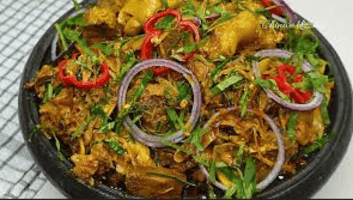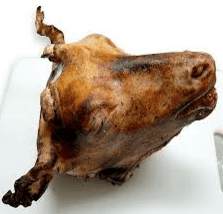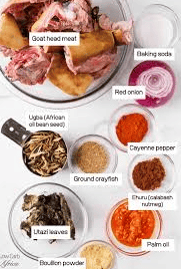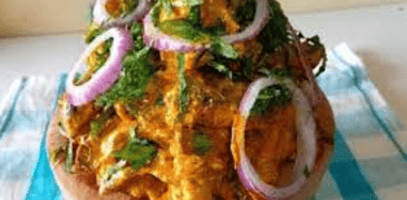Are you ready to embark on a culinary adventure into one of Nigeria’s most celebrated delicacies? Today, we’re diving deep into the art of preparing Isi Ewu, a mouth-watering spicy goat head dish that’s particularly popular in the eastern part of Nigeria.
This Nigerian Isi Ewu recipe will guide you through creating this flavorful dish that’s perfect for special occasions or when you want to impress guests with authentic Nigerian cuisine.

What is Isi Ewu?
Isi Ewu, which literally translates to ‘goat head’ in Igbo language, is more than just a dish – it’s a celebration of bold flavors and traditional cooking techniques.
This Nigerian Isi Ewu recipe combines tender goat meat with a fiery pepper sauce that will tantalize your taste buds and leave you craving more.
Essential Equipment Needed
Before diving into our Nigerian Isi Ewu recipe, ensure you have these kitchen tools ready:

- Large cooking pot
- Sharp knife and cutting board
- Blender for spices
- Large mixing bowls
- Wooden cooking spoons
- Kitchen gloves (for handling hot peppers)
- Strainer or colander
- Measuring cups and spoons
Ingredients for Nigerian Isi Ewu
For the Goat Head:
- 1 whole cleaned goat head, split into sections
- 2 medium onions, diced
- 3 tablespoons uziza spice (piper guineense)
- 2 tablespoons utazi leaves, chopped
- Salt to taste
- 2 stock cubes
For the Pepper Sauce:
- 10 habanero peppers (adjust to taste)
- 5 red bell peppers
- 2 large onions
- 2 tablespoons ground crayfish
- Palm oil (about 1 cup)
- 2 tablespoons native ogiri (fermented oil seeds)
- Salt to taste
Detailed Step-by-Step Preparation Instructions
Step 1: Preparing the Goat Head (45 minutes)
- Thoroughly clean the goat head, removing any hair and unwanted parts
- Cut into smaller, manageable pieces
- Place in a pot with diced onions, stock cubes, and salt
- Add water to cover the meat
- Boil until tender but not falling apart (approximately 45 minutes)
Step 2: Making the Pepper Sauce (30 minutes)
- Blend habanero and bell peppers with onions until smooth
- Heat palm oil in a separate pot until hot but not smoking
- Add blended pepper mixture and allow to cook for 15 minutes
- Add ground crayfish and ogiri
- Season with salt to taste
- Simmer for another 10-15 minutes until oil floats to the top
Step 3: Combining and Finishing (15 minutes)
- Add the cooked goat head pieces to the pepper sauce
- Sprinkle uziza spice and chopped utazi leaves
- Stir gently to combine all ingredients
- Cook in low heat for 5-10 minutes to allow flavors to melt into the meat
- Taste and adjust seasoning if needed
Important Tips for Success
Selection of Goat Head
- Choose a fresh, properly cleaned goat head
- Ensure it’s from a young goat for tenderness
- Ask your butcher to help clean and section it properly
Pepper Management
- Wear gloves when handling hot peppers
- Adjust pepper quantity based on heat preference
- Don’t skip the red bell peppers as they add color and depth
Cooking Temperature
- Maintain medium heat throughout cooking
- Don’t rush the process – proper cooking ensures tender meat
- Allow sauce to reduce properly for concentrated flavors
Troubleshooting Common Issues
Tough Meat
- Solution: Extend cooking time and ensure enough water during boiling
- Prevention: Choose younger goat head and don’t rush the cooking process
Too Spicy
- Add more palm oil or reduce pepper quantity
- Start with less pepper and adjust to taste
Watery Sauce
- Continue simmering until excess water evaporates
- Properly reduce pepper sauce before adding meat
Storage and Serving Suggestions
- Keep leftovers in refrigerator for up to 3 days in an airtight container
- Serve hot with chilled beer, palm wine, or soft drinks
- Pairs well with boiled yam, rice, or garri
- It can be eaten as an appetizer or a main course.
Health and Nutritional Benefits
This Nigerian Isi Ewu recipe provides:
- High-quality protein from goat meat
- Essential vitamins from fresh peppers
- Healthy fats from palm oil
- Minerals and nutrients from traditional spices
FAQs
What part of Nigeria is Isi Ewu from?
Isi Ewu originates from the eastern part of Nigeria, particularly among the Igbo people. It’s especially popular in states like Abia, Anambra, and Enugu.
Can I use goat meat instead of goat head?
While you can use regular goat meat, traditional Isi Ewu specifically uses goat head for its unique texture and flavor. The combination of tender meat, skin, and cartilage creates the authentic experience.
How spicy is authentic Isi Ewu?
Authentic Nigerian Isi Ewu recipe typically calls for a significant amount of heat from habanero peppers. However, you can adjust the spiciness to your preference without compromising the dish’s authenticity.
Where can I buy the traditional spices needed?
Traditional spices like uziza and utazi can be found in African markets or specialty stores. Online African food stores also stock these ingredients.
How long does it take to cook Isi Ewu?
The total cooking time is approximately 1.5 to 2 hours, including preparation and cooking of both the meat and sauce.
Can I prepare Isi Ewu in advance?
Yes, you can get it ready a day in advance. The flavors actually develop better when left overnight, making it perfect for party preparation.
What makes Isi Ewu different from other Nigerian pepper soups?
The unique combination of spices, particularly uziza and utazi, along with the specific use of goat head, distinguishes Isi Ewu from other Nigerian pepper soups.
Conclusion…
This Nigerian Isi Ewu recipe brings the authentic taste of eastern Nigeria right to your kitchen. By following these detailed instructions and tips, you’ll be able to create this beloved delicacy that’s perfect for special occasions or when you’re craving something extraordinarily flavorful.
Remember, the key to perfect Isi Ewu lies in the balance of spices and proper cooking of the meat. Don’t be afraid to adjust the spiciness to your preference while maintaining the dish’s traditional character.
Whether you’re an experienced cook or trying Nigerian cuisine for the first time, this recipe provides all the guidance you need to create a memorable dish. Share this Nigerian Isi Ewu recipe with friends and family who appreciate bold, flavorful foods and help keep this traditional delicacy alive for generations to come.


